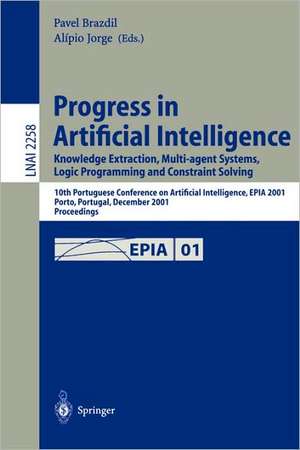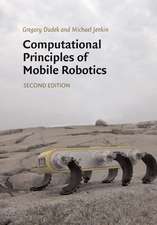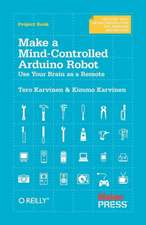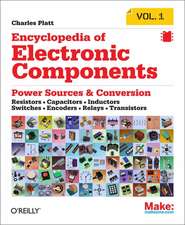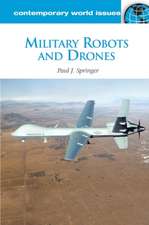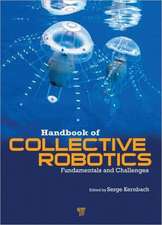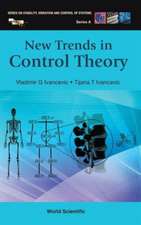Progress in Artificial Intelligence: Knowledge Extraction, Multi-agent Systems, Logic Programming, and Constraint Solving: 10th Portuguese Conference on Artificial Intelligence, EPIA 2001, Porto, Portugal, December 17-20, 2001. Proceedings: Lecture Notes in Computer Science, cartea 2258
Editat de Pavel Brazdil, Alipio Jorgeen Limba Engleză Paperback – 5 dec 2001
Din seria Lecture Notes in Computer Science
- 20%
 Preț: 1061.55 lei
Preț: 1061.55 lei - 20%
 Preț: 307.71 lei
Preț: 307.71 lei - 20%
 Preț: 438.69 lei
Preț: 438.69 lei - 20%
 Preț: 579.30 lei
Preț: 579.30 lei -
 Preț: 410.88 lei
Preț: 410.88 lei - 17%
 Preț: 427.22 lei
Preț: 427.22 lei - 20%
 Preț: 596.46 lei
Preț: 596.46 lei - 15%
 Preț: 448.04 lei
Preț: 448.04 lei - 20%
 Preț: 353.50 lei
Preț: 353.50 lei -
 Preț: 389.49 lei
Preț: 389.49 lei - 20%
 Preț: 309.90 lei
Preț: 309.90 lei - 20%
 Preț: 645.28 lei
Preț: 645.28 lei - 20%
 Preț: 763.23 lei
Preț: 763.23 lei - 15%
 Preț: 580.46 lei
Preț: 580.46 lei - 20%
 Preț: 310.28 lei
Preț: 310.28 lei - 20%
 Preț: 655.02 lei
Preț: 655.02 lei - 20%
 Preț: 1183.14 lei
Preț: 1183.14 lei - 20%
 Preț: 340.32 lei
Preț: 340.32 lei -
 Preț: 449.57 lei
Preț: 449.57 lei - 20%
 Preț: 591.51 lei
Preț: 591.51 lei - 18%
 Preț: 938.83 lei
Preț: 938.83 lei - 20%
 Preț: 337.00 lei
Preț: 337.00 lei - 20%
 Preț: 649.50 lei
Preț: 649.50 lei - 20%
 Preț: 607.40 lei
Preț: 607.40 lei - 20%
 Preț: 1414.79 lei
Preț: 1414.79 lei - 20%
 Preț: 1024.44 lei
Preț: 1024.44 lei - 20%
 Preț: 583.40 lei
Preț: 583.40 lei - 20%
 Preț: 453.32 lei
Preț: 453.32 lei - 20%
 Preț: 575.49 lei
Preț: 575.49 lei - 20%
 Preț: 1075.26 lei
Preț: 1075.26 lei - 20%
 Preț: 585.88 lei
Preț: 585.88 lei - 20%
 Preț: 825.93 lei
Preț: 825.93 lei - 17%
 Preț: 360.20 lei
Preț: 360.20 lei - 20%
 Preț: 763.23 lei
Preț: 763.23 lei - 20%
 Preț: 340.32 lei
Preț: 340.32 lei - 20%
 Preț: 504.58 lei
Preț: 504.58 lei - 20%
 Preț: 369.13 lei
Preț: 369.13 lei - 20%
 Preț: 580.93 lei
Preț: 580.93 lei - 20%
 Preț: 343.62 lei
Preț: 343.62 lei - 20%
 Preț: 350.21 lei
Preț: 350.21 lei - 20%
 Preț: 583.40 lei
Preț: 583.40 lei - 20%
 Preț: 583.40 lei
Preț: 583.40 lei - 15%
 Preț: 438.59 lei
Preț: 438.59 lei - 20%
 Preț: 341.95 lei
Preț: 341.95 lei - 20%
 Preț: 238.01 lei
Preț: 238.01 lei - 20%
 Preț: 538.30 lei
Preț: 538.30 lei
Preț: 339.34 lei
Preț vechi: 424.17 lei
-20% Nou
Puncte Express: 509
Preț estimativ în valută:
64.94€ • 70.52$ • 54.55£
64.94€ • 70.52$ • 54.55£
Carte tipărită la comandă
Livrare economică 22 aprilie-06 mai
Preluare comenzi: 021 569.72.76
Specificații
ISBN-13: 9783540430308
ISBN-10: 354043030X
Pagini: 436
Ilustrații: XII, 424 p.
Dimensiuni: 155 x 235 x 23 mm
Greutate: 0.61 kg
Ediția:2001
Editura: Springer Berlin, Heidelberg
Colecția Springer
Seriile Lecture Notes in Computer Science, Lecture Notes in Artificial Intelligence
Locul publicării:Berlin, Heidelberg, Germany
ISBN-10: 354043030X
Pagini: 436
Ilustrații: XII, 424 p.
Dimensiuni: 155 x 235 x 23 mm
Greutate: 0.61 kg
Ediția:2001
Editura: Springer Berlin, Heidelberg
Colecția Springer
Seriile Lecture Notes in Computer Science, Lecture Notes in Artificial Intelligence
Locul publicării:Berlin, Heidelberg, Germany
Public țintă
ResearchCuprins
Invited Speakers.- Agent Programming in Ciao Prolog.- Multi-relational Data Mining: A Perspective.- A Comparison of GLOWER and Other Machine Learning Methods for Investment Decision Making.- Extraction of Knowledge from Databases.- Parallel Implementation of Decision Tree Learning Algorithms.- Reducing Rankings of Classifiers by Eliminating Redundant Classifiers.- Non-parametric Nearest Neighbor with Local Adaptation.- Selection Restrictions Acquisition from Corpora.- Classification Rule Learning with APRIORI-C.- Proportional Membership in Fuzzy Clustering as a Model of Ideal Types.- Evolution of Cubic Spline Activation Functions for Artificial Neural Networks.- Multilingual Document Clustering, Topic Extraction and Data Transformations.- Sampling-Based Relative Landmarks: Systematically Test-Driving Algorithms before Choosing.- Recursive Adaptive ECOC models.- A Study on End-Cut Preference in Least Squares Regression Trees.- Artificial Intelligence Techniques for Financial Time Series Analysis.- The Use of Domain Knowledge in Feature Construction for Financial Time Series Prediction.- Optimizing the Sharpe Ratio for a Rank Based Trading System.- Multi-agent Systems:Theory and Applications.- Choice: The Key for Autonomy.- Dynamic Evaluation of Coordination Mechanisms for Autonomous Agents.- Evolving Multi-agent Viewpoints — An Architecture.- Enabling Agents to Update Their Knowledge and to Prefer.- Modelling Agent Societies: Co-ordination Frameworks and Institutions.- Argumentation as Distributed Belief Revision: Conflict Resolution in Decentralised Co-operative Multi-agent Systems.- Scheduling, Re-scheduling and Communication in the Multi-agent Extended Enterprise Environment.- Electronic Institutions as a Framework for Agents’ Negotiation and Mutual Commitment.-An Imitation-Based Approach to Modeling Homogenous Agents Societies.- Logics and Logic Programming for Artificial Intelligence.- Situation Calculus as Hybrid Logic: First Steps.- A Modified Semantics for LUPS.- On the Use of Multi-dimensional Dynamic Logic Programming to Represent Societal Agents’ Viewpoints.- A Procedural Semantics for Multi-adjoint Logic Programming.- Representing and Reasoning on Three-Dimensional Qualitative Orientation Point Objects.- Encodings for Equilibrium Logic and Logic Programs with Nested Expressions.- A Context-Free Grammar Representation for Normal Inhabitants of Types in TA?.- Permissive Belief Revision.- Constraint Satisfaction.- Global Hull Consistency with Local Search for Continuous Constraint Solving.- Towards Provably Complete Stochastic Search Algorithms for Satisfiability.- A Combined Constraint-Based Search Method for Single-Track Railway Scheduling Problem.- Planning.- A Temporal Planning System for Time-Optimal Planning.- SimPlanner: An Execution-Monitoring System for Replanning in Dynamic Worlds.- Hybrid Hierarchical Knowledge Organization for Planning.- STeLLa: An Optimal Sequential and Parallel Planner.
Caracteristici
Includes supplementary material: sn.pub/extras
